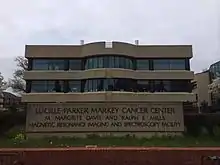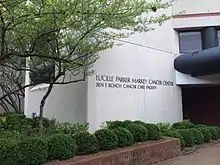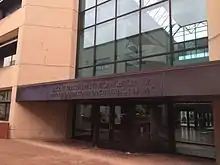Markey Cancer Center
The University of Kentucky (UK) Markey Cancer Center is an academic, clinical and research center located in Lexington, Kentucky. It was established in 1985, and has grown to 28 departments across eight colleges. Markey has four clinic facilities located in three buildings, with dedicated research spaces in the Dorothy Enslow Combs Cancer Research Facility and Healthy Kentucky Research Building.
| Markey Cancer Center | |
|---|---|
| Albert B. Chandler Hospital | |
 M. Margrite Davis and Ralph E. Mills Magnetic Imaging and Spectroscopy Center | |

| |
| Geography | |
| Location | 800 Rose Street, Lexington, Kentucky, United States |
| Coordinates | 38.0316446°N 84.5084135°W |
| Organization | |
| Type | Teaching |
| Affiliated university | University of Kentucky College of Medicine |
| Services | |
| Standards | National Cancer Institute |
| Speciality | Cancer Research and Treatment |
| History | |
| Opened | 1983 |
| Links | |
| Website | markeycancercenter.htm |
The UK Markey Cancer Center is led by Director B. Mark Evers, MD, FACS. Dr. Evers joined Markey in this role in 2009 with more than 20 years of experience in cancer care, specializing in gastrointestinal oncology surgery. In his new role, Dr. Evers brought $5.5 million worth of National Institutes of Health (NIH) grants, and a team of faculty researchers with an additional $8.5 million in NIH funding, all with the common goal of ending cancer in Kentucky.
History
The McDowell Cancer Network was created in 1975 as an outreach/education program.
The overarching mission of Markey is to reduce cancer mortality in Kentucky through a comprehensive program of cancer research, treatment, education and community engagement. On July 12, 2013 Markey Cancer Center was designated as a National Cancer Institute facility. Markey is the only NCI-designated cancer center in Kentucky and the 68th in the United States. Markey is estimated to receive $17.6 million from the NCI annually, with $10.8 million in direct costs.[1]
Members are aligned with one of four research programs: Cancer Cell Biology and Signaling; Cancer Prevention and Control; Drug Discovery, Delivery and Translational Therapeutics; and Genomic Instability, Epigenetics and Metabolism.
Five shared research facilities (SRFs) provide services to support research: Biostatistics and Bioinformatics; Biospecimen Procurement and Translational Pathology; Cancer Research Informatics; Flow Cytometry and Cell Sorting; and Redox Metabolism. Two developing SRFs are aligned with the center’s recent scientific expansions: Behavioral and Community-Based Research and Oncogenomics.[2]
Facilities
The Markey Cancer Center is located on the University of Kentucky's campus. It is found on the north central side of the UK Albert B. Chandler Hospital facility.
The UK Markey Cancer Center includes four buildings grouped around a central courtyard, as well as a new patient floor in the UK Albert B. Chandler Hospital. These facilities are the Ben F. Roach Cancer Care Facility, the Dorothy Enslow Combs Cancer Research Facility, the M. Margrite Davis and Ralph E. Mills Magnetic Imaging and Spectroscopy Center, and the Marylou Whitney and John Hendrickson Cancer Facility for Women. These four facilities comprise the Markey Cancer Center, all working together on the prevention, treatment and cure for cancer.[3]

Ben F. Roach Cancer Care Facility
The Ben F. Roach Cancer Care Facility (Pavilion CC) of the Markey Cancer Center provides over 52,000 square feet of space dedicated to the individualized care of cancer patients across the four story facility.
Outpatient clinical space on the ground floor supports the Hematology Program, Bone Marrow Transplant (BMT) Program and the Radiation Medicine outpatient clinic; modern radiation therapy equipment is located in the basement. The second and third floors house inpatient rooms with satellite bases for all primary services and outpatient cancer services for Radiation Oncology, Hematologic/BMT disease, and Head, Neck and Respiratory disease. A linear accelerator and brachytherapy unit are located in the basement of the Ben F. Roach Building of the cancer center and a GAMMA Knife irradiation facility is located in the underground corridor connector between the Roach Building and the UK Hospital.
The fourth floor houses office space for clinical and research faculty, and the MCC Research Communications Office (RCO), which provides critical infrastructure for grant/manuscript preparation, editing, and graphics assistance.
M. Margrite Davis and Ralph E. Mills Magnetic Imaging and Spectroscopy Center
The Margrite Davis and Ralph Mills Magnetic Resonance Imaging and Spectroscopy Center houses instrumentation, research laboratories and support services for molecular, cellular, animal and human spectroscopic imaging, aiding the study of disease processes and evaluation of responses to treatment. The office tower of the MRISC Building is integrated with the Whitney-Hendrickson building.

Dorothy Enslow Combs Cancer Research Facility
The Combs Building provides over 24,500 square feet of laboratory, office and conference spaces. It houses primary research laboratories dedicated to cancer research, including core facilities for high field NMR, DNA sequencing, protein sequencing, peptide synthesis and oligonucleotide synthesis. In addition to its research facilities, the Combs Building is also home to Markey's support services from clinical social workers, registered dietitians, integrative medicine clinicians and more.
Marylou Whitney and John Hendrickson Cancer facility for Women
The Whitney-Hendrickson Facility housing Davis Center functions as the MCC’s primary ambulatory care facility. The three-story facility houses outpatient space for evaluation and treatment of solid tumor neoplasms including: lung, head and neck, sarcoma, GI, and urologic cancers (1st floor); breast cancer (2nd floor); and gynecologic cancers (3rd floor).
Patient Care
Markey has developed a variety of specialized multidisciplinary cancer specialty teams that include nurses, doctors and other professionals throughout UK HealthCare to give our patients. These innovative teams evaluate and treat the patient’s disease, which means that physicians and nurses from multiple specialties work with each patient to develop the best treatment plan for their particular circumstances. In 2019, Markey treated over 3,700 cases by tumor site across more than 112,000 visits. In partnership with UK Radiation Oncology, Markey also provided more than 23,800 radiation oncology treatments.
Advanced Treatment Options
Markey offers a variety of advanced treatment options. Each option is provided to patients by a team of experts in the innovative new treatment.
CAR T-cell therapy is offered to those who have failed the standard of care for diffuse large b-cell lymphoma and would otherwise have limited options for care. This therapy is a major breakthrough in the treatment of B-cell lymphoma and leukemia available in a select few cancer centers across the country, and only offered in Kentucky at Markey through the Cell Therapy Program (CTP) in the Division of Hematology.[4]
Hyperthermic intraperitoneal chemotherapy (HIPEC), a heated chemotherapy treatment, also known as a chemotherapy bath, is delivered directly to the abdomen during surgery. Markey’s multidisciplinary team uses HIPEC to treat patients with colorectal cancer, ovarian cancer, appendix cancer, small intestinal cancer, stomach cancer, and primary peritoneal cancer.[5]
Lutathera is an option used to treat patients with neuroendocrine tumors. Lutathera can help slow down the growth of tumors or stop them from growing at all. It can also help manage symptoms caused by the neuroendocrine tumor.
Markey also provides a variety of radiation oncology treatments as well. UK Radiation Oncology provides treatments such as Brachytherapy, Varian Halcyon treatment, Deep Inspiration Breath Hold (DIBH) therapy, external beam radiation and more.
Research
The Markey Cancer Center is a diverse matrix enterprise associated with University of Kentucky. Its broad mission is to reduce the morbidity and mortality of cancer through a comprehensive program of cancer research, education, patient care and community outreach.
Markey's research programs span the entire spectrum of cancer epidemiology and etiology, molecular expression and regulation, cancer prevention, early detection and treatment. Associated member scientists include faculty from 28 departments across eight colleges.
Four formal programs are organized to facilitate coordinated efforts in areas of particular breadth and strength. These include:
- Cancer Cell Biology and Signaling
- Cancer Prevention and Control
- Drug Discovery, Delivery and Translational Therapeutics
- Genomic Instability, Epigenetics and Metabolism
Markey Cancer Center has particularly strong research and programmatic ties to the UK Colleges of Pharmacy and Public Health in addition to all of the oncology departments and divisions of the UK College of Medicine, its primary organizational base.
Affiliate and Research Networks
Markey places great value in collaboration and innovation in cancer care, directing two collaborative networks: the Markey Cancer Center Affiliate Network and Markey Cancer Center Research Network.
The Affiliate Network aims to enhance access to high-quality cancer services and programs through collaboration with community hospitals. Markey’s vision is for Kentuckians and those from surrounding states to have access to excellent cancer care, and the Affiliate Network’s regional members aim to impact cancer patients, families and caregivers, local doctors and communities.
The Research Network is an alliance of doctors who conduct clinical research studies in the prevention, early detection and treatment of cancers. The network provides innovative research studies, support and education for Markey research centers and thorough quality assurance so that Markey studies can meet the highest ethical standards.
Community Outreach
Community outreach and engagement are integral and well-established priorities within the spectrum of Markey research, clinical, and population-level activities. Markey’s commitment to community originated with the McDowell Cancer Network (1975) and has grown significantly over the past 40 years. A number of important early initiatives—each supporting dynamic community coalitions and community-engaged research across Kentucky through productive partnerships—contributed to today’s Markey comprehensive program of community outreach and engagement. All Markey community outreach and engagement activities are driven by the disparities present in Kentucky and the environmental, socioeconomic, and behavioral contexts of its residents, all of which are intricately linked to the state’s cancer risk profile.
As the only NCI-designated Cancer Center in Kentucky, Markey defines its catchment area as all 120 Kentucky counties, with emphasis on the 54 Appalachian counties. This definition aligns with UK’s land-grant mission and the state’s pervasive shared cancer risk and incidence and mortality profiles. Notably, Kentucky (population 4.4 million) continues to rank first among all states for all-site cancer incidence and mortality and for selected cancers. While Kentucky cancer statistics lead the nation, Appalachian Kentucky cancer rates exceed those of Kentucky and point to extraordinary regional disparities and thus the basis for emphasis on the underserved eastern Kentucky population.
Awards and Reception
On July 12, 2013 Markey Cancer Center was designated as a National Cancer Institute facility.[6] Markey is estimated to receive $1.5 million from the NCI annually.[7] Kentucky has increased from 49th to 23rd in screening rates within a decade. Markey patients' have a five-year survival rate in ovarian, lung, brain, prostate, and Stage IV colorectal cancer higher than patients from other centers in Kentucky. Nationally, Markey's five-year survival rates are higher in brain, liver, and prostate cancers than other patients.[8]
Since 2017, Markey has been designated as a Top 50 ranked cancer hospital in the nation by U.S. News & World Report.[9]
References
- "About Markey". UK HealthCare. 2020-07-07. Retrieved 2020-07-07.
- "Markey Research". UK HealthCare. 2020-07-07. Retrieved 2020-07-07.
- "Markey Cancer Center Buildings". UK HealthCare. 2020-07-07. Retrieved 2020-07-07.
- "CAR T-cell Therapy". UK HealthCare.
- "HIPEC Treatment". UK HealthCare.
- "UK Markey Cancer Center Gains NCI Designation". WUKY. 2013-06-12. Retrieved 2015-04-14.
- "National Cancer Institute designation". UK Healthcare. 2015-04-13. Retrieved 2015-04-14.
- "UK's Markey Cancer Center touts long-term survival rate". Kentucky.com. 2011-09-07. Retrieved 2015-04-14.
- "UK HealthCare is No. 1 in Kentucky; Cancer Care Ranks 33rd Nationally in U.S. News & World Report Ratings". UKNow.